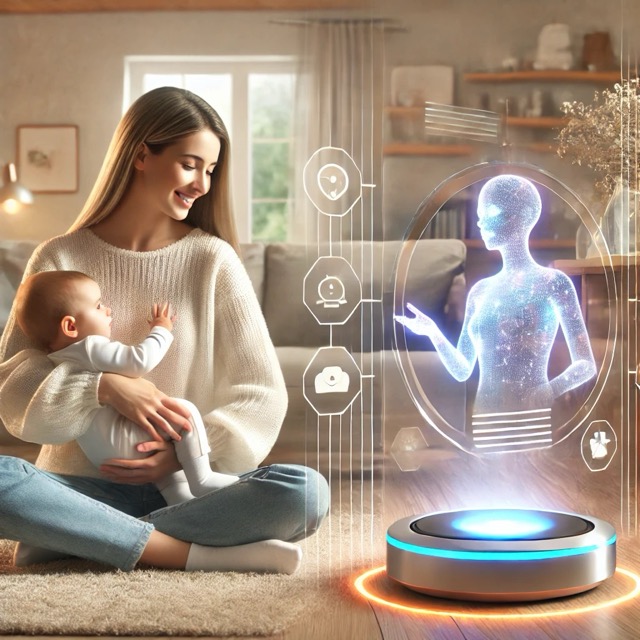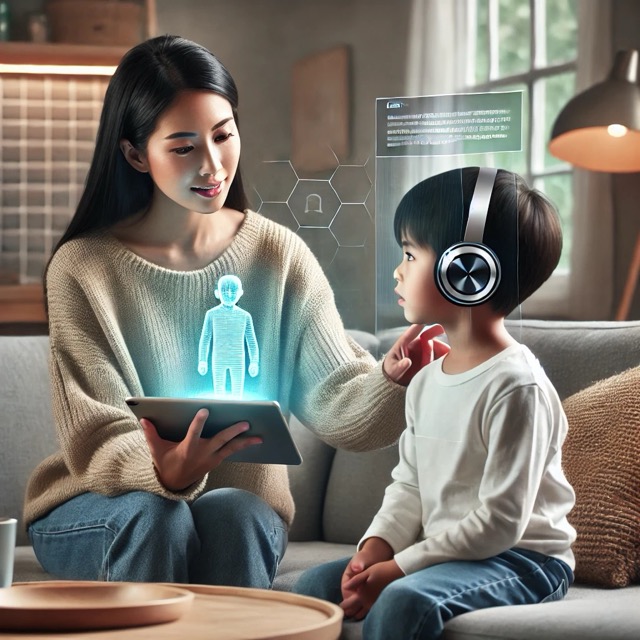AI and the Future of Parenting: How ChatGPTs Will Transform Motherhood and Raising Children


The rapid advancement of artificial intelligence (AI) is ushering in transformative changes across various aspects of life. Parenting and motherhood—domains traditionally shaped by intuition, cultural wisdom, and personal experience—are no exception. As we move deeper into the digital age, AI tools like ChatGPT and other intelligent systems are becoming integral parts of how we navigate modern parenting challenges.
But what does the future hold for mothers raising children with the assistance of AI? Will these tools enhance or complicate the parenting experience? Let’s explore how AI might revolutionize motherhood in the coming years, highlighting both the potential benefits and downsides.
The Projected Benefits of AI in Parenting
🤰🏻 Personalized Parenting Guidance
One of the most significant impacts of AI on parenting is the ability to offer personalized advice and resources. ChatGPTs and other AI systems are capable of analyzing vast amounts of data and customizing information to fit an individual’s unique needs. Imagine a mother with a newborn who can access round-the-clock guidance on feeding schedules, sleep routines, and developmental milestones, tailored specifically to her baby’s needs. Instead of scrolling through forums or guessing which parenting blog to trust, AI can distill the most relevant and evidence-based insights in seconds.
Mothers today already use apps to track feedings, sleep cycles, and developmental milestones, but AI can take this further by offering real-time solutions. For example, based on patterns of a child’s sleep, AI could suggest specific interventions to improve sleep quality, backed by both scientific research and practical wisdom from countless other parents in similar situations. This level of personalized parenting advice could drastically reduce the guesswork that often accompanies early motherhood.
❤️🩹 Emotional Support and Stress Management
Motherhood is a journey filled with emotional highs and lows. While traditional support networks such as family and friends remain invaluable, AI tools may soon offer an additional layer of emotional support. ChatGPTs, for example, could serve as accessible, judgment-free sounding boards for mothers who need to vent, process emotions, or even seek coping strategies for parenting-related stress.
AI could also provide mothers with mindfulness exercises, guided meditations, or practical techniques for reducing anxiety and managing stress. Imagine an AI that recognizes when a mother is feeling overwhelmed (based on her tone, words, or even her heart rate from a wearable device) and responds with helpful suggestions tailored to her mood. For mothers balancing work, family, and personal well-being, this kind of emotional support could be life-changing.
👨🏻🏫 Enhanced Education for Children
In addition to supporting mothers, AI will likely transform how we educate and raise children. With the increasing sophistication of AI tutoring systems, children could have personalized, interactive educational experiences from an early age. Whether learning to read, mastering arithmetic, or exploring creative pursuits like art and music, AI could adapt lessons to each child’s unique learning style and pace.
For mothers, this could be a major relief. Instead of feeling pressure to teach their children or monitor their academic progress in detail, AI could provide insights into a child’s learning patterns, identifying strengths and areas that need additional support. This would empower mothers to make informed decisions about their children’s education, whether in traditional schools or through alternative learning models such as homeschooling.
Moreover, with AI’s multilingual capabilities, mothers could raise bilingual or even trilingual children more easily, with AI providing language immersion experiences that mimic human conversation. This opens up exciting possibilities for raising globally-minded children.
🏠 Streamlined Household Management
One of the most practical applications of AI for mothers is in the realm of household management. Juggling chores, meal planning, and childcare can feel like an endless task. AI-powered assistants could help streamline these responsibilities by automating meal planning, grocery shopping, and even suggesting child-friendly recipes based on dietary needs and preferences.
For example, AI could track a family’s nutritional intake and make personalized recommendations for meals that balance convenience, health, and taste preferences. It could also help busy mothers manage schedules, ensuring that kids’ activities, appointments, and even social interactions are balanced and coordinated. This could free up more time for mothers to engage in meaningful activities with their children, rather than spending endless hours managing logistics.
♿️ Inclusive Support for Mothers with Diverse Needs
AI tools can be customized to support mothers from various backgrounds, including those with special needs or unique parenting challenges. For example, mothers of children with disabilities could benefit from AI-driven insights into therapies, resources, and learning aids that are specifically tailored to their child’s condition. Additionally, multilingual AI systems can provide critical parenting support to mothers in non-English speaking communities, breaking down language barriers and ensuring they have access to essential resources.

The Potential Downsides of AI in Motherhood
While the benefits of AI in parenting are promising, it’s essential to also consider the potential downsides and challenges.
🤖 Over-reliance on AI
One of the most pressing concerns is the risk of becoming overly reliant on AI systems for decision-making. While AI can offer valuable guidance, it’s important to remember that it is ultimately a tool, not a replacement for human judgment. There’s a risk that mothers may rely too heavily on AI, potentially stifling their own intuition and critical thinking. Parenting involves nuances that may be difficult for AI to fully understand or predict, and relying too much on data-driven advice could lead to a disconnect from the more instinctual aspects of motherhood.
Moreover, there’s the possibility that some AI-generated advice may not always align with a mother’s personal values or parenting philosophy. AI can suggest solutions based on patterns and probabilities, but it may not always consider the full complexity of a family’s unique dynamics or cultural background.
🔒 Privacy and Data Security Concerns
AI systems rely on vast amounts of personal data to function effectively. For mothers, this raises legitimate concerns about privacy and data security. Parenting apps and AI tools that track children’s development, health, and daily routines could become targets for cyberattacks or data breaches. There’s also the question of how much personal data is being shared with AI developers and whether that information could be used for commercial purposes.
Mothers need to be aware of the potential risks and ensure they’re using AI systems that prioritize privacy and data protection. Educating oneself on the security policies of these platforms will be crucial to maintaining trust in AI-driven parenting solutions.
📭 Reduced Human Interaction
While AI can simulate human-like conversation and provide personalized support, it’s important to remember that it cannot replace the richness of human relationships. Over-reliance on AI for emotional support or guidance may inadvertently lead to reduced interaction with real-life social networks, such as family, friends, or parenting communities.
Parenting is inherently a social experience, and while AI can augment that experience, it cannot replace the value of shared human wisdom, community support, and face-to-face interactions. For mothers who are already feeling isolated, leaning too heavily on AI may exacerbate feelings of disconnection from the real world.
⚖️ Equity and Accessibility Issues
While AI has the potential to democratize access to parenting resources, there’s also the risk that these tools will not be equally accessible to all. AI systems are often designed and developed in technologically advanced nations, which can lead to a gap in accessibility for mothers in low-income or rural areas without reliable internet access. The digital divide could mean that only certain segments of the population benefit from AI-powered parenting tools, leaving others behind.
Additionally, the cost of premium AI services or devices may be prohibitive for some families, creating inequities in access to the latest parenting technologies. Ensuring that AI solutions are accessible to all mothers, regardless of socioeconomic status, will be a critical challenge moving forward.
The Balance Between AI and Human Intuition
In the coming years, the integration of AI in parenting will undoubtedly reshape motherhood in profound ways. AI’s ability to offer personalized guidance, streamline household management, and support children’s education will ease many of the burdens modern mothers face. However, like any tool, AI must be used mindfully, with a balance between leveraging its power and maintaining the emotional and intuitive aspects of parenting.
While AI can help mothers make more informed decisions, it should never replace the deep wisdom that comes from personal experience, cultural traditions, and the collective support of a community. As AI continues to evolve, mothers will need to strike a delicate balance between the convenience and efficiency that technology offers and the timeless values of human connection, empathy, and intuition.
As we look to the future, it’s clear that AI has the potential to enhance the parenting experience in incredible ways. However, it’s up to each mother to determine how best to integrate these tools into her own journey, always with the awareness that true parenting involves not just data and algorithms, but also love, compassion, and a deep understanding of the unique needs of her child.
In this brave new world, AI will be a helpful ally—but it will always be mothers, with their infinite adaptability and wisdom, who guide the next generation forward.





Responses